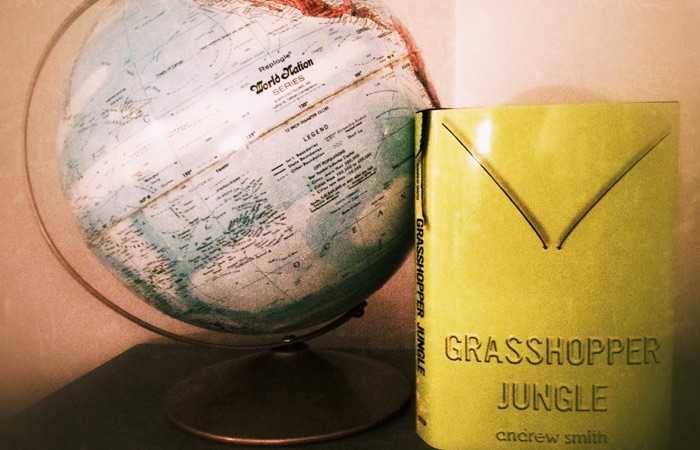The Giant Mantises of Grasshopper Jungle, and 5 More Bizarre Fictional Apocalypses
How does that famous poem go again?
“This is the way the world ends
This is the way the world ends
This is the way the world ends
Not with a bang but with giant freaking bugs.”
I’m pretty sure it’s something like that, at least according to Grasshopper Jungle, a sensational new YA novel from author Andrew Smith. Not content to settle for the vague disasters that left Panem a compartmentalized republic in The Hunger Games or transformed Chicago into a dilapidated half-ruin in Divergent, Smith offers up a much weirder end-of-the-world scenario: giant bugs. Specifically, an army of six-foot-tall, hungry and, er, rather aroused praying mantises.
The true brilliance of Grasshopper Jungle is that while on one level it’s the story of an insect apocalypse, with swarms of the bugs stampeding across the globe, devouring every human they encounter in a frantic attempt to locate a mate and reproduce, it’s also a sometimes crass, sometimes poignant look at adolescence. The metaphor is apt—I’d wager the only thing stopping most teenagers from ravaging the countryside in search of a mate is a noted lack of giant, spiked mandibles and a bulletproof exoskeleton.
While you’ll be hard-pressed to find a funnier, weirder, more satisfying apocalyptic novel than this one (early reviews have compared it to the likes of Kurt Vonnegut), authors have ended the world in some pretty weird ways before. Below, a sampling of 5 of our favorites:
Killer plants smother the globe (The Day of the Triffids, by John Wyndham)
If giant predator bugs are a bit too visceral for you, giant invasive plants offer another way to go. In Wyndham’s sci-fi classic, the planet is overrun with mobile, semi-intelligent plants of mysterious origin. At first, things don’t seem so bad. Humans quickly figure out how to coexist with the creatures, whose secretions offer a bountiful energy source. But then a second disaster hits—a strange solar event renders much of the planet sightless, allowing the plants to spread unchecked and driving humanity into small, isolated communes to survive.
Grey Goo apocalypse (Blood Music, by Greg Bear)
Grey Goo is the name scientists have given to an end-of-all-life scenario involving nanotechnology run rampant. The theory goes that if we created microscopic machines for a particular task (say, cell repair in cancer patients), there’s a chance they could “evolve” and begin to rapidly reproduce and infect every living thing, eventually creating so many copies of themselves that the entire planet would be covered in…grey goo. Just such an event occurs in Bear’s award-winning sci-fi novel; things get so bad the entire continent of North America becomes one uniform lump of sludge. Things get weirder from there.
Words that can (and do) hurt us (The Flame Alphabet, by Ben Marcus)
There are a surprising number of books that deal with the concept of language with the power to kill (last year’s Lexicon, by Max Barry, being an excellent why-haven’t-you-read-it-yet example), but in none of them is it quite so massively lethal. Marcus imagines a scenario where the speech of children causes the bodies of adults to slowly wither and die. There is no cure. There is no treatment. There is only the end of everything.
Where were you when the world stopped turning? (The Age of Miracles, by Karen Thompson Walker)
One day, for a reason no one can determine, the Earth starts spinning a little slower. The days and nights start getting longer. And longer. The effect on humanity is insidious, inexorable. In short, everyone starts to lose it. It becomes difficult to grow enough food to feed everyone. Within a generation, days last for weeks and the it’s clear no one is going to live to see too many more of them.
Snow. Forever. (The Snow, by Adam Roberts)
What if it started snowing… and never stopped? That’s the scenario explored in this early novel from British science-fiction writer Adam Roberts (who is, sadly, sparsely published in the U.S.). Prolonged, heavy snow begins to fall everywhere, and keeps piling up, eventually covering the planet in a shell of snow hundreds of miles thick. Their tallest cities long-buried, the remnants of humanity survive by digging out elaborate systems of tunnels and warrens, and trying to figure out what comes next. And you thought Westeros had it bad.
What’s the strangest fictional end-times scenario you’ve encountered?
